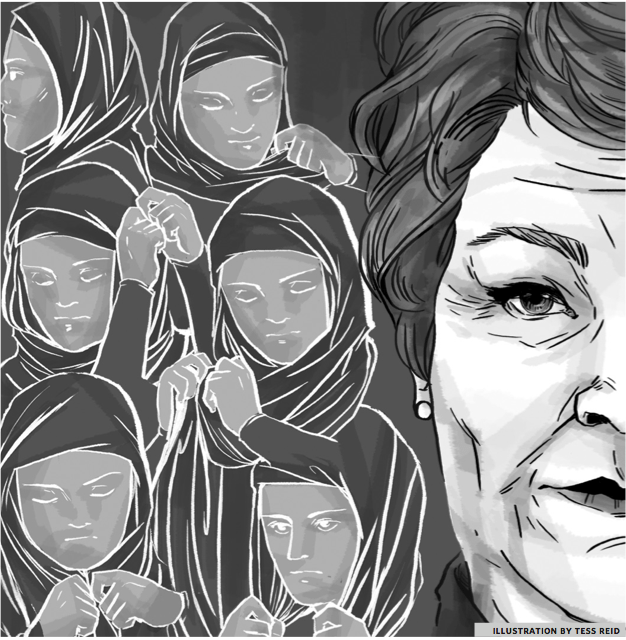The PowerPoint slides for my first few lecture of Canadian Cinema this year showed some pretty interesting images. Pictures of Quebec Premier Pauline Marois, as well as the Quebec emblem, are pasted next to ones of Nazi Germany, swastikas, and Adolf Hitler. In class, this comparison seems apt.
Marois generally wishes to make her province more French than it is English, which in theory isn’t all that malicious. However this year, her party took a turn for the more questionable when they readied a bill banning all religious attire and symbols. Specifically, Marois and her supporters targeted hijabs and turbans.
Why was the bill proposed? Because Marois is striving for a single, unified province. She’s tearing down the separations caused by religion. Hey, that sounds like
a good way to eliminate religious-born conflict!
Or wait…does it sound like a way to create one supreme religion/ race?
Yes, the doors have been opened for all kinds of racism and sexism, on the bus and in the streets, as justified by the province’s actual law. There are absolutely compari- sons to be made to a pre-World War II Germany, and believe me, no one is missing that assessment.
But Nazi Germany is a historical low point for the world. No one is more ashamed of it than Germans themselves, and the events that transpired there are pretty much unanimously considered evil.
The Parti Que?be?cois, on the other hand, is a party currently in power just a few hundred kilometers away. Universities, are – hypothetically supposed to be open to everyone, regardless of race, gender, and yes, political views. People who hold liberal views don’t necessarily want liberalism taught to them with the arts. Intelligent, kind-hearted Quebec separatists would be dismayed to see their beliefs suggested as Holocaust-esque.
At the same time, can we, as university students, ignore assault and prejudice – especially when it’s so close to us? Marois’ laws are allowing things to happen that would be seen as despicable in Toronto.
There’s a viral video that shows just how far Quebecers can go – a man basically throws hate speech at a woman on a bus in that rare, totally legal kind of way. This feels an awful lot like those situations where years after the fact, people will be wondering why the by-standers stood aside.
Do students from Quebec feel the history and politics of their province are being taught fairly? Are we over-generalizing, and turning the whole of Quebec into an enemy?
Basically, there is a danger that these PowerPoint slides might be teaching us who we’re against. The Canadian Cinema class got pretty heated, but almost every student was anti-Que?be?cois. Some of the comments, in a rather ironic twist of hypocrisy, could be construed as quite hateful: “If they all want to speak only French, why don’t they go back to Europe?” one student said, unknowingly mirroring the sentiments professed by the racist on the bus who demanded that people with hijabs should go back to the Middle East.
Ideally, current political situations, no matter how contentious, should probably be taught as cold facts, allowing us to figure out what we think.
If the Parti Que?be?cois really is a Nazi party on the rise, surely our years of education about the Holocaust will have prepared us to already recognize such a resemblance without assistance, and act accordingly, right?
At the same time, if such a resemblance exists, there may be a very fine line between students critically thinking and simply recognizing something as objectively harmful. It seems impossible to discuss laws that allow for racism and sexism without being analytical. Any professor’s personal feelings are going to be implicit in the discussion.
Yes, in schools, and especially in the arts, professors should be keeping their opinions to themselves. But in a politically-charged world, and especially in the arts, this is simply wishful thinking.
Dustin Dyer
Features Editor



